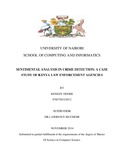| dc.description.abstract | In this work, we attempt to resolve the problem of mining text and classifying them into positive,
negative and neutral to detect crime by applying Sentiment analysis on people‟s opinions
expressed on social media. We attempt to resolve this problem by first presenting the user with a
summative view of the complete data set, summarized by a label or a score, and subsequently by
segmenting the opinions/sentiments into three classes (affirmative, negative and impartial).
This project developed sentiment analyzer that is appended on the browser, it then analyses the
posted keywords or tweets and uses language normalizers to identify with the Kenyan context. If
the post or the tweet is from Kenyan context it is given a score of one if it is not directly from the
Kenyan context it is given a score of 0.5 .The keyword is then labeled with the three outputs of
negative, positive and neutral after which a training is done in several rounds to ensure accuracy.
Based on the above model a prototype was developed that was based on the Naïve Bayes in
which test runs were conducted on balanced corpus 460 ( keywords) and unbalanced corpus 860
(keywords).
The sent analyzer was able to classify the keywords into the three categories. To evaluate the
prototype three accuracy standards were applied, these were precision, recall and accuracy, the
results obtained from experiments with the classifier show that the classifier is capable of
performing classification with an accuracy of 77.8% for sentiments obtained from Social Media.
This is near human accuracy, as apparently people agree on sentiment only around 80% of the
time. Most of the sentiments in this data are expressed partly in English, Swahili, thus formal
language is scarcely used. We therefore conclude that the model of classification selected is
ideal for the kind of data collected from social media on Kenyan opinions.
The findings of this research will be of great importance to the researchers by adding another
perspective of Naïve Bayes in opinion mining as well as the law enforcement agencies in
identifying negative opinions in the social media.
Keywords: Sent analyzer, Crime analyzer, intelligent crime analyzer, web based sent analyzer. | en_US |

